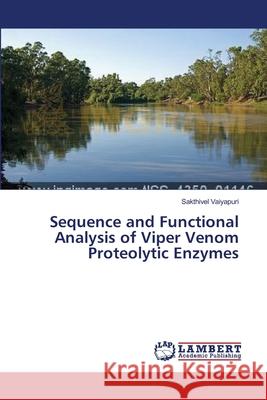Sequence and Functional Analysis of Viper Venom Proteolytic Enzymes » książka
Sequence and Functional Analysis of Viper Venom Proteolytic Enzymes
ISBN-13: 9783659399183 / Angielski / Miękka / 2013 / 296 str.
Snake venom proteins are potential sources for novel drug design both for treatment of snake bites and human haemostatic disorders. To achieve these, the basic sequence, structure and functional relationships of venom proteins should be fully understood. Proteolytic enzymes such as metallo and serine proteases are the major components of viper venoms and responsible for severe envenomation effects. In this work, a serine protease and a metalloprotease from the venom of Bitis gabonica rhinoceros were purified, sequenced and functionally characterised. Nine further serine protease sequences were obtained from the venom gland transcriptome of this snake for complete sequence analysis within this species. To understand more about the sequence, structure and functional relationships of viper venom serine proteases (VVSPs) in general, all VVSP sequences were extracted from sequence databases and the analysis showed that VVSPs share common sequence and structural features. A phylogenetic analysis explains the evolutionary relationships of VVSPs from different species. This work is targeted to the wider audience in the field of toxicology and cardiovascular research.
Snake venom proteins are potential sources for novel drug design both for treatment of snake bites and human haemostatic disorders. To achieve these, the basic sequence, structure and functional relationships of venom proteins should be fully understood. Proteolytic enzymes such as metallo and serine proteases are the major components of viper venoms and responsible for severe envenomation effects. In this work, a serine protease and a metalloprotease from the venom of Bitis gabonica rhinoceros were purified, sequenced and functionally characterised. Nine further serine protease sequences were obtained from the venom gland transcriptome of this snake for complete sequence analysis within this species. To understand more about the sequence, structure and functional relationships of viper venom serine proteases (VVSPs) in general, all VVSP sequences were extracted from sequence databases and the analysis showed that VVSPs share common sequence and structural features. A phylogenetic analysis explains the evolutionary relationships of VVSPs from different species. This work is targeted to the wider audience in the field of toxicology and cardiovascular research.











